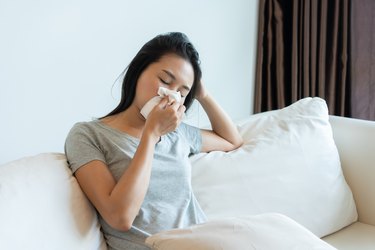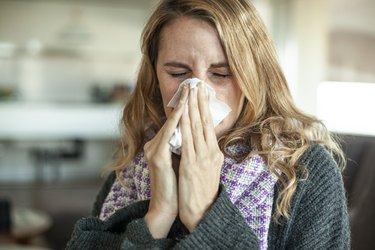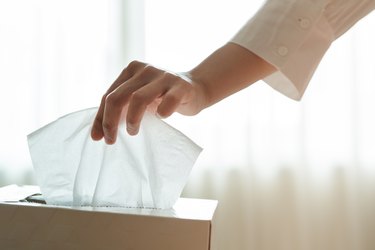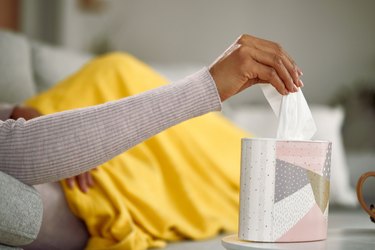
A runny or stuffy nose can have you going through endless amounts of tissues. Blowing your nose is natural — and it may alleviate congestion that comes from a cold, allergies or any other irritation.
Believe it or not, there's actually a proper way to blow your nose. Blowing it too hard could cause damage and lead to more problems than you started with.
Video of the Day
Video of the Day
Here, Zara Patel, MD, an ENT specialist, explains the right way to blow your nose and other options to clear out your nostrils without excessive nose blowing.
The One Thing to Avoid When You Blow Your Nose
There's only one wrong way to blow your nose, and that's blowing too hard, Dr. Patel says.
The contents in your nose that you're forcefully trying to push out can be pushed into other areas connected to the nose — like your sinuses and middle ear spaces.
"This could turn a simple cold or viral upper-respiratory infection within the nasal cavity into a sinus or ear infection," Dr. Patel says. "Inflammation can then cause your sinus drainage pathways (or eustachian tubes) to swell, and the normal mucus your body produces becomes trapped."
Once this happens, there's a higher chance of bacterial growth and infection. A viral nasal infection can easily become a viral sinus or ear infection, which can then become complicated by a bacterial sinus or ear infection, Dr. Patel says. (A viral infection can weaken your immune defenses so that normally harmless bacteria in these areas can then take advantage of the situation to grow out of control and cause a bacterial infection.) This would require the use of antibiotic medication to treat.
What's more, excessive nose blowing can also affect the inside of your ears.
"Rarely, if enough pressure is used repetitively to blow the nose, it could cause the ear drums to become less taut, more floppy and less able to conduct sound," Dr. Patel adds. This could cause your ears to hurt or pop when you blow your nose.
How to Blow Your Nose Properly
Ultimately, less is more when it comes to blowing your nose. You can start by applying less pressure when you blow and keeping your mouth slightly open.
"This simple maneuver automatically prevents you from building up a large amount of pressure in the nasal cavity, as it's released through your mouth instead," Dr. Patel says.
And a gentle snuffle at the front of your nose is much better than a big "honk," she adds.
If there's ever a time where you feel like you need to blow your nose really hard, use your thumbs to put pressure on the outside of your ears to close them off. Then, use the rest of your fingers to apply a tissue to your nose, Dr. Patel says.
"This will at least keep the pressure change in your ears to a minimum," she says. "But this maneuver will only help your ears — it will not prevent you from spreading the mucus into your sinuses."
How to Unstuff Your Nose Without Blowing It
An alternative to blowing your nose is doing a rinse instead. In fact, rinsing your nose and sinuses with salt water is the best way to naturally decongest and clear them, Dr. Patel says. This can also be a great dry nose remedy.
"As long as you use distilled water or boil the water that comes out of the tap, rinsing is completely safe, and it can decrease the duration of a cold or sinus infection and prevent a simple cold from becoming a full-on infection."
Indeed, nasal irrigation is a safe and easy way to clear your sinuses and bring relief from allergies or a cold, according to the Cleveland Clinic. To rinse your nose, you'll need saline solution and a container, like this neti pot from SinuCleanse ($12.49 on Amazon) or a nasal rinse bottle (like this one from Walmart for $8.99).You'll then follow these steps:
- Lean over a sink (or do this in the shower) and tilt your head to one side.
- Insert the spout of the container or bottle filled with saline solution into your upper nostril.
- Breathe through your nose and gently pour solution into your upper nostril. Liquid will drain through the lower nostril.
- Repeat on the other side.
Watch It
If you need visual instructions for nasal irrigation, Dr. Patel has created this video as a step-by-step guide.
When to See a Doctor
Every now and then, you may have blood come out when you've blown your nose too hard.
In most cases, a nosebleed isn't something to be too concerned about. Bleeding can also be a result of dry air, nose-picking, blood-thinning medications and other environmental factors, according to the Cleveland Clinic.
Nosebleeds can usually be taken care of at home, but you should see a doctor if you're unable to get the bleeding under control within 15 to 20 minutes of applying direct pressure to your nose. And call 911 or visit your nearest emergency room if you experience significant blood loss or injury.
Warning
If you're experiencing frequent unexplained nosebleeds, see a doctor to identify the cause and receive proper treatment.
The Bottom Line
There is such a thing as blowing your nose the wrong way. It shouldn't be done with too much force or pressure in order to prevent worsened congestion and infection.
"Also keep in mind that when it feels like you have to blow your nose, but nothing comes out, it's often just swollen nasal tissue, not trapped mucus," Dr. Patel says. "There really may be nothing to blow out."
Was this article helpful?
150 Characters Max
0/150
Thank you for sharing!
Thank you for your feedback!
Is this an emergency? If you are experiencing serious medical symptoms, please see the National Library of Medicine’s list of signs you need emergency medical attention or call 911.


